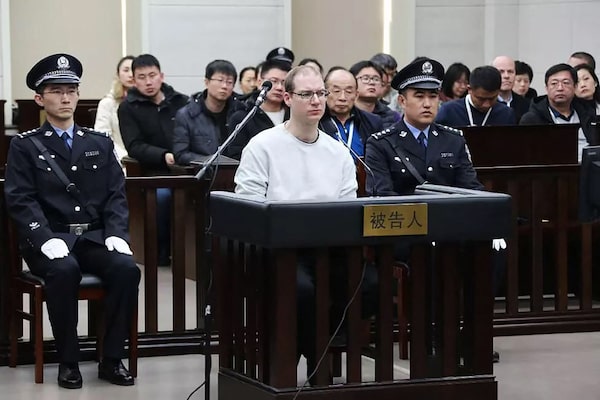
Dominic Barton, Canada's ambassador to China, stands near a barricade tape at a detention centre to meet Canadian Michael Spavor, in Dandong, China, on Aug. 11.Ng Han Guan/The Associated Press
After he took Beijing to task for the 11-year sentence handed to Canadian Michael Spavor on Wednesday, Foreign Affairs Minister Marc Garneau was asked if the ball is now in the Americans’ court.
He talked about intense discussions with the U.S. government, and noted the Biden administration has promised to act as though the two Canadians arbitrarily imprisoned in China were U.S. citizens. Translation: Yes. Canada is looking to the Americans to make a deal.
Canada condemns China’s 11-year prison sentence for businessman Michael Spavor
Send a message to Michael Spavor and Michael Kovrig as they near 1,000 days in detention in China
This is a case of hostage diplomacy. And Canada is asking the U.S. to negotiate for Canadian hostages.
The reason is pretty obvious. Canada wants to get Mr. Spavor and fellow Canadian Michael Kovrig home. So do Canadians. Both men have been imprisoned since December, 2018, in obvious retaliation for the arrest of Huawei chief financial officer Meng Wanzhou.
Mr. Spavor, Mr. Kovrig and their families have suffered, and there is no sign of an end. The two men have languished in Chinese cells, while being used cruelly as bargaining chips. Another Canadian, Robert Schellenberg, has seen his drug trafficking sentence increased from imprisonment to death.

Canadian Robert Lloyd Schellenberg, centre, during his retrial on drug trafficking charges in the court in Dalian in China's northeast Liaoning province on Jan. 14, 2019. A Chinese court on Aug. 10 said it had rejected an appeal by Mr. Schellenberg, who was sentenced to death on drug smuggling charges in a case that has drawn condemnation from Canada.Supplied/AFP/Getty Images
It is also pretty clear why Mr. Garneau was talking about the U.S. at his press conference on Wednesday. The Americans have something to bargain with. Ms. Meng was arrested in Vancouver at the request of the U.S., which is seeking to extradite her. The Americans are the ones who can bargain.
It also matters why Mr. Garneau is hinting at U.S. involvement now. That’s because there is a sense that, if there is no break soon, this hostage-diplomacy standoff could last years. But there are still hazards in negotiating with hostage-takers, or asking someone else to do it.
The Canadian government has insisted, rightly, that it was following the rule of law when it arrested Ms. Meng. It can’t just cave to Chinese pressure.
But going to the Americans and asking them to bend is another form of concession. It tells China that hostage diplomacy works, and encourages the country to do it again. Beijing hasn’t been able to push the U.S. into making a deal Ms. Meng will accept, but its hostage diplomacy has convinced Canada to ask Washington to cut a deal.
After the Spavor verdict, Mr. Garneau talked about many countries, allies and others working together to push back at China’s arbitrary detentions, and U.S. Secretary of State Antony Blinken called for the “unconditional release” of the Canadians. But when Mr. Garneau talks about an American solution, he’s talking about a deal for Ms. Meng.

Huawei chief executive Meng Wanzhou arrives at B.C. Supreme Court to attend her extradition hearing in Vancouver on Aug. 11.DARRYL DYCK/The Canadian Press
So far, there hasn’t been any sign a plea deal is close. Ms. Meng faces charges of making fraudulent statements to a bank, HSBC, that put it at risk of violating U.S. sanctions against Iran. But U.S. prosecutors might have a bigger, broader case against Huawei, for commercial espionage.
In retrospect, Canada’s quiet diplomacy after the 2018 arrests was a mistake. Ottawa should have been screaming louder and retaliating, if only to exact a cost in an uneven fight, with diplomatic symbols like expelling an ambassador. It also should have been pushing harder for the Biden administration’s idea to muster allies in confronting China. Ottawa should have floated the idea of moving the 2022 Beijing Olympics, on broader human rights grounds, months ago.
A B.C. judge is soon to rule on whether Ms. Meng’s extradition can go ahead. Soon after, all the players are likely to dig in.
The judge’s decision won’t be the end of it. After that, Justice Minister David Lametti must decide if Ms. Meng will be extradited. But at this point it would be a political scandal if a judge approved the extradition and the minister caved to Chinese pressure. If the minister approves extradition, Ms. Meng can go to a new round of appeals that could last three or four years.
That could extend the impasse. China may be harming its own reputation, but its leaders aren’t likely to cave on the detentions without a way to save face. Canada can’t abandon rule of law to release Ms. Meng. U.S. President Joe Biden is in a confrontation with China, and the political consensus is that he should be even tougher.
Now Canada is almost openly calling on the Americans to bend on its behalf. Canadian officials have quietly pressed Washington before. And there is still not a lot of hope that throwing the ball back into the U.S. court will end the standoff, after all this time.
Prime Minister Justin Trudeau said a Chinese court's sentencing of Canadian businessman Michael Spavor to 11 years in prison for espionage on Wednesday was 'absolutely unacceptable' and called for his immediate release. Flora Bradley-Watson reports.
Reuters
Our Morning Update and Evening Update newsletters are written by Globe editors, giving you a concise summary of the day’s most important headlines. Sign up today.